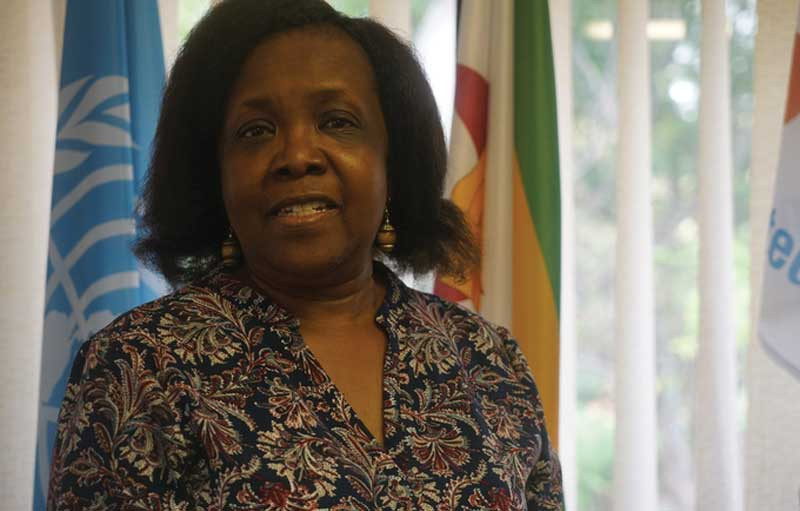
Growing up, conversations about sex were taboo. All I knew about sex was that if you indulge, you will get a sexually transmitted infection (STI) such as HIV and you will basically be doomed.
Hence, when I got to college, at the age of 19, I had quite the culture shock. My jaw dropped when I saw my fellow students collecting condoms displayed on a UNFPA labelled dispenser without any shame or stigma.
They talked about sex the same way they did about food or any other everyday conversation, as if it was nothing out of the ordinary.
I recall asking my roommate a lot of questions pertaining to that and she told me about the well-known mother of the whole college, SAYWHAT.
From more interactions with the work of SAYWHAT that works with support from UNFPA, I have since shelved the taboos. I have opened my mind to new things as much as possible, a decision I’m proud of as I pen these thoughts down.
Today, at age 23, I am a feminist activist, Sexual and Reproductive Health and Rights (SRHR) defender and National Coordination Committee member for SAYWHAT. I had the opportunity to organise the 10th African Conference on SRH that took place this year in June, in Sierra Leone.
I have attended countless workshops that have made me a better feminist leader, and advocate for young people. Thanks to the life skills I have attained through SAYWHAT, I have found a way that I can give back to my community and be the voice of the voiceless.
When I first joined SAYWHAT, I had no clue what SRHR was. To imagine I had no idea that precum (pre-ejaculation fluid) could make one pregnant and also transmit HIV and STIs.
- SAYWHAT’s peer education arm touches young girls
- Child marriage: A heavy cost for young girls in Africa
- Child marriage comes with a heavy cost
- Youths suffer from suicide
Keep Reading
This made me wonder how many other young people from my community lacked this knowledge and access to comprehensive sexuality education. It made me wonder how many other young people were getting pregnant due to the myths and misconceptions that are associated with sex, contraceptives and condoms.
SAYWHAT has given young people, especially at tertiary institutions, the opportunity to lead activities that benefit their health and as a result, more young people are getting to realize that they can treasure their pleasure while being safe. I am sure this has and will continue to contribute to the creation of ‘A Generation of Healthy Young People’ which happens to be SAYWHAT’s motto.
It is under the Safeguard Young People Programme (SYP), which is ongoing with the generous support from the Government of Switzerland, with Technical Assistance and guidance by UNFPA, and implemented through several partners, state and Non state actors, that many young people like Chengeto’s lives are being touched.
Among the key interventions under the programme is the setting up of resource centres where young people like Chengeto can have access to life saving information and services. These resource centres are available in all the provinces of Zimbabwe.
Every young person will one day have life-changing decisions to make about their sexual and reproductive health. Yet research shows that the majority of adolescents lack the knowledge required to make those decisions responsibly, leaving them vulnerable to coercion, sexually transmitted infections and unintended pregnancy.
Comprehensive sexuality education is central to UNFPA and partners’ work as it increases the uptake of sexual and reproductive health services. UNFPA works to implement comprehensive sexuality education, both in schools and outside of schools.
Through innovative approaches including peer to peer dialogue, mass lectures, health fairs and the usage of social media platforms, youth friendly education is provided to students. The interventions do not only ensure access to SRH services but also improves the knowledge and competence of youth in dealing with various sexual and reproductive health challenges.
In other work, SAYWHAT through its new innovations, The Orange-Hub Podcast series, and other radio listening sessions, has tackled issues that are affecting young people, such as drug and substance abuse, menstrual health and sexual harassment. Although the podcast targets young people, anyone can learn from the discussions taking place.
Complementing these interventions is the Call Centre, a safe space that can be accessed with a simple dial of 577. Everyone, young and old, can cry for help, get counselling services, report abuse or request any assistance they need.
“We have been able to touch the lives of many young people under the Safeguard Young People Programme thanks to the support of the Government of Switzerland,” said UNFPA Country Representative Dr. Esther Muia.
“As UNFPA, we appreciate the strong partnerships with friends of Zimbabwe like Switzerland, and the government as well as supportive communities that continue to ensure we make critical investments in the lives and future of the young people in Zimbabwe.” – UNFPA/SayWhat










